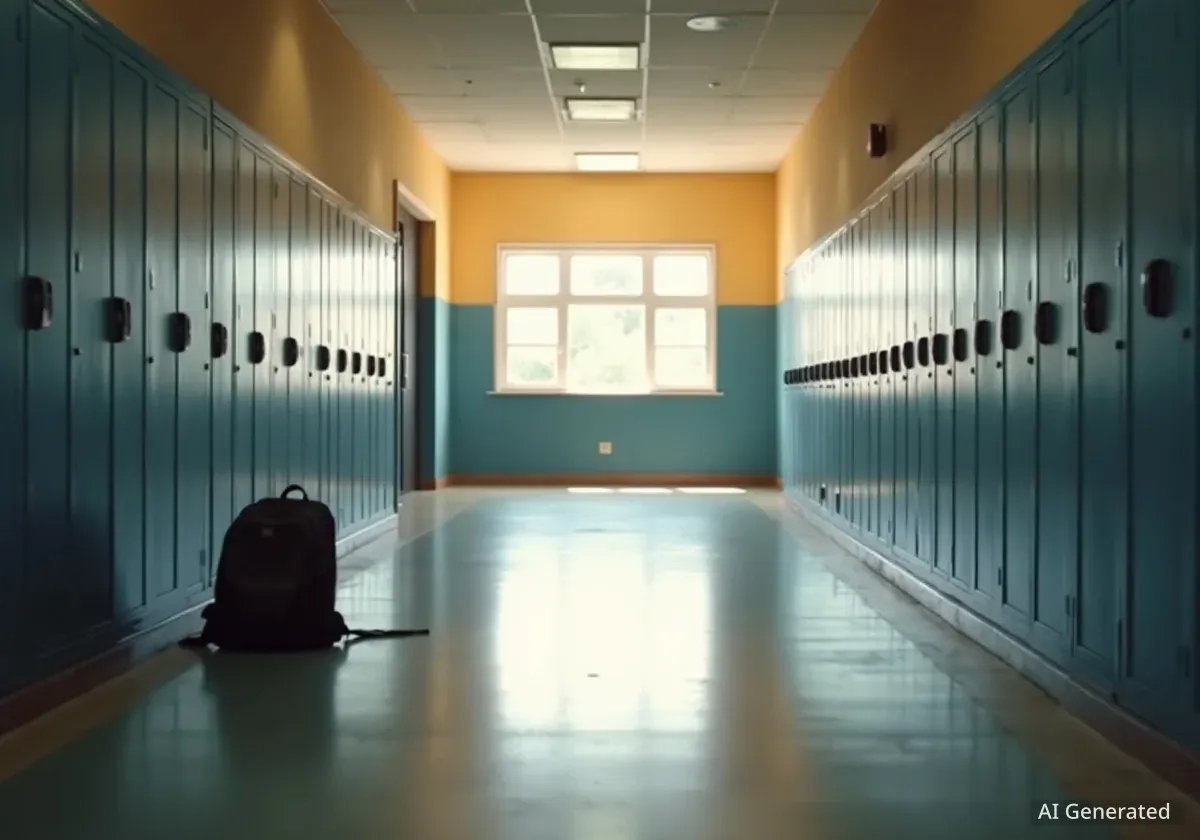A state commission in New Jersey has recommended a comprehensive "bell-to-bell" ban on student cell phone use in schools. The proposal comes after a study on the effects of social media on adolescents, citing significant concerns about mental health, academic performance, and social development.
The report, produced by the New Jersey Commission on the Effects of Social Media Usage on Adolescents, gives local school districts the authority to implement the policy. If adopted, the ban would apply throughout the entire school day, including on buses, during lunch, and between classes.
Key Takeaways
- A New Jersey commission has officially recommended a "bell-to-bell" cell phone ban for students in schools.
- The recommendation is based on findings linking social media use to increased anxiety, depression, and shorter attention spans in adolescents.
- The proposal grants local school districts the flexibility to adopt and enforce their own policies.
- The recommendation aligns with pending state legislation that has bipartisan support and has already passed the State Senate.
Details of the Proposed Ban
The recommendation from the state-appointed panel is extensive. The proposed "bell-to-bell" restriction would prohibit student cell phone use from the moment they arrive at school until the final bell rings. This includes non-instructional times that are often a part of the school day.
The policy would cover periods such as lunch breaks, time between classes, and transportation on school buses. It would also extend to any school-sanctioned events that occur during school hours. The commission, which included a diverse group of students, parents, educators, and mental health professionals, concluded that a comprehensive approach is necessary to address the issue effectively.
The authority to implement these bans would rest with individual school districts, allowing for local control and flexibility in how the policy is applied.
Legislative Framework
The commission's report supports existing legislative efforts. A bill sponsored by Assemblyman Cody Miller, D-Gloucester, directs the New Jersey Department of Education to create official guidelines for managing cell phone and social media use during instructional time. This legislation is designed to provide a statewide framework while still allowing for local adaptation.
Concerns Over Student Well-Being
The driving force behind the recommendation is the growing body of evidence linking excessive social media use to negative outcomes for young people. Mental health experts on the commission pointed to a clear correlation between screen time and emotional distress.
Stephanie Marcello, the chief psychologist for Rutgers University Behavioral Health Care, highlighted the risks for students between the ages of 10 and 19. She explained that research shows a direct connection between high social media use and mental health challenges.
"Social media use, particularly in those age groups, increases things like anxiety and depression and even loneliness and suicide," Marcello stated.
Beyond mental health, the commission's report notes significant impacts on academic life. Constant access to cell phones is linked to shorter attention spans and a reduced ability for students to engage with classroom material. Marcello also emphasized the loss of crucial in-person social skills.
"Learning how to connect with people, how to deal with things right there, being aware of what’s going on around you and not just having your head down in a phone," she added, describing the skills at risk.
Teen Internet Usage
Studies indicate that a significant number of teenagers are almost constantly connected to the internet. According to recent data, nearly 50% of teens report being online on a near-constant basis, with the vast majority visiting social media sites daily.
Flexibility and Political Momentum
While the proposal calls for a broad ban, lawmakers recognize the need for specific exceptions. Assemblyman Miller's bill ensures that policies are not a "one-size-fits-all" solution. It gives school districts the freedom to shape rules that best fit their communities.
"It gives school districts the flexibility to determine which policies work best for them to limit cell phone use within the classroom," Miller said. The legislation also includes an important provision for students with documented medical conditions who require access to their phones.
The push for these restrictions has strong political backing. In his State of the State address in January, New Jersey Governor Phil Murphy expressed his support for a school cell phone ban. He noted that constant connectivity makes it difficult for students to retain what they learn.
Miller's bill has gained bipartisan support, and an identical version of the measure already passed the New Jersey State Senate earlier this year. He expects the Assembly version to be scheduled for a vote in the near future.
Broader Recommendations for Society
The commission's report extends beyond school policies, offering a wider set of recommendations aimed at parents, technology companies, and healthcare providers.
The report suggests that schools should integrate digital citizenship and media literacy into their curriculum to better prepare students for the online world. Commission co-chairs Pearl Gabel and Charles Gelinas described the report as a vital roadmap.
"Social media has rewired childhood, and the stakes could not be higher," Gabel and Gelinas said in a joint statement. "New Jersey has the opportunity to lead the nation and prove that when it comes to our children, safety and well-being come first."
Responsibilities for Parents and Tech Companies
The commission outlined several key actions for other stakeholders:
- Parents: The report advises parents to delay giving their children access to social media. When access is granted, parents should actively monitor usage and establish clear boundaries.
- Social Media Companies: The commission calls on platforms to restrict access for users younger than 16. It also urges them to develop better tools for parents and improve resources to combat cyberbullying, discrimination, and child exploitation.
- Healthcare Providers: Medical professionals are encouraged to screen adolescents for signs of "problematic social media use" to allow for early identification of risks and intervention.
New Jersey Education Commissioner Kevin Dehmer praised the commission's work and emphasized the need for ongoing action. "We must continue to review new research in light of the recommendations presented to address the pressing issue of health and academic impacts of social media use on our students," he said.





